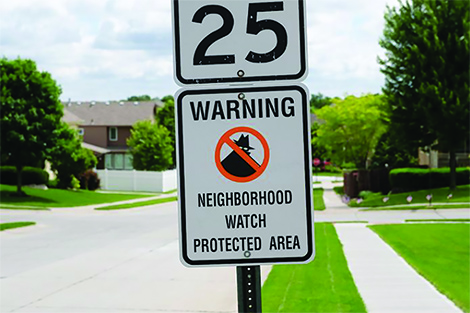Have you seen increasing graffiti in your neighborhood? Perhaps you’ve heard of an uptick in car thefts on your block, or maybe a child’s bicycle was stolen off a porch. Incidents like this can cause anxiety and frustration among a community’s residents, and may lead you to consider forming a Neighborhood Watch program.
The U.S. Department of Justice defines a Neighborhood Watch as “a group of people living in the same area who want to make their neighborhood safer by working together and in conjunction with local law enforcement to reduce crime and improve their quality of life.†The agency states that Neighborhood Watch programs go back nearly 70 years, but truly came into prominence in the 1970s and ‘80s.
Many communities already have such programs in place. If yours doesn’t, here are the best ways to establish one:
Gauge neighborhood interest, hold a meeting.
The first step is to talk to neighbors and try to gauge interest. It might help to mention that Neighborhood Watches can help with crime reduction, improved community relations, better harmony with law enforcement, and ultimately, better quality of life. Talk to the neighbors you know first, and then, if you feel inclined, go door to door. Distribute flyers at local businesses to promote the idea.
Once you find enough interested parties, organize a meeting with the people who responded favorably to the idea. Try a local coffee shop, library or community center as a potential location. As you plan, it is important to get local law enforcement involved. Ask the police department to send a liaison to the initial meeting. Their involvement can help formalize the Neighborhood Watch, and they can help provide information and resources to get the group started. The Department of Justice also recommends registering the group with USAonWatch, the national organization for Watch groups.
Establish leadership, goals and agendas.
During your meeting, establish leadership for the Neighborhood Watch program. Establish block captains, who generally oversee a proximity of 10 to 15 houses. The block captain maintains relations with neighbors and checks in about their concerns on an ongoing basis.
Your group also needs a Neighborhood Watch coordinator who organizes the list of members, acts as a liaison between members, officers, civic groups and block captains, and continues to arrange meetings and training for the group. It’s also vital to have rank-and-file members hold leadership accountable and voice the needs of the community at-large.
You’ll also want to determine some key objectives for the group and establish times for training programs with help from local law enforcement. The group can also decide if it wants to focus on neighborhood patrols, cleanup days, crime-prevention seminars, or other activities.
Raise awareness and maintain momentum.
As you kick off your Neighborhood Watch, be sure to raise awareness. You can host a launch event, create a website, or circulate newsletters. Make sure to maintain communication with other leaders and the law enforcement liaison.
Once you’re up and running, set a regular meeting time for the community at-large to participate in the Neighborhood Watch. In these meetings, your area’s residents can raise any concerns or report suspicious activities.
With that, your Neighborhood Watch is ready to go. These groups can bring your neighborhood together and also greatly improve quality of life.
Justin Lavelle, who wrote this article,

is the chief communications officer for BeenVerified (beenverified.com), a source of online background checks and contact information such as criminal records.
WHO YOU GONNA CALL?
Neighborhood Block Watches are a way that citizens can try to improve the public safety of their communities. Here are phone numbers to call for help from police departments and crime prevention programs in start block watches in the following jurisdictions:
Auburn 253-931-3080
Edgewood 253-952-0275
Federal Way 253-835-6720
King County 206-296-3311
Pierce County 253-798-3624
Puyallup 253-841-5531
University Place 253-798-3141
BE SAFE OUT THERE (AND AT HOME)
Law enforcement officials note that seniors are the target of many types of criminals. With that in mind, the King County Sheriff Department has some advice for being alert and safe, both at home and when out and about.
- Make your home safe and secure. Install good locks on doors and windows. Don’t hide keys in mailboxes and planters or under doormats. Instead, leave an extra set of keys with a neighbor or friend.
- Ask for photo identification from service or delivery people before letting them in. If you are the least bit worried, call the company to verify.
- Be sure your street address number is large, visible and well-lighted so police and other emergency personnel can find your home quickly.
- Consider a home alarm system that provides emergency monitoring for burglary, fire, and medical emergencies.
- Get involved in the community. Report any crime or suspicious activities to police. Join a Neighborhood Watch. Work to help improve your neighborhood. Volunteer as a citizen patroller, tutor for children, office aide in the police or fire department, mentor for teens, or escort for individuals with disabilities.
- Be alert when out and about. Go with friends or family, not alone. Carry your purse close to your body, not dangling by the straps. Put a wallet in an inside coat or front pants pocket. Don’t carry credit cards you don’t need or large amounts of cash. Keep car doors locked, whether you’re a passenger or driver. Be particularly alert in parking lots and garages. Park near an entrance.
- Use direct deposit for Social Security and other regular checks.
- Sit close to the driver or near the exit while riding a bus, train, or light rail. If someone or something makes you uneasy, trust your instincts and leave.